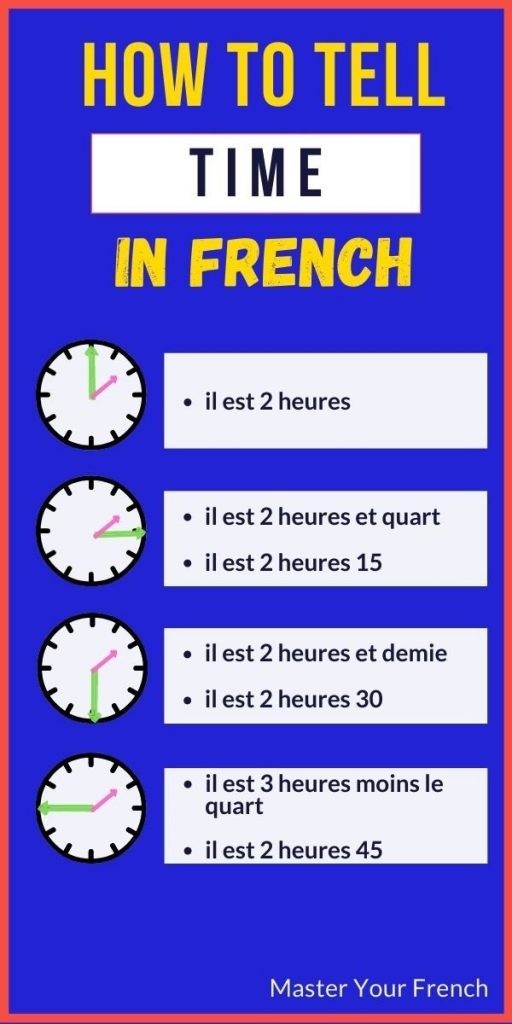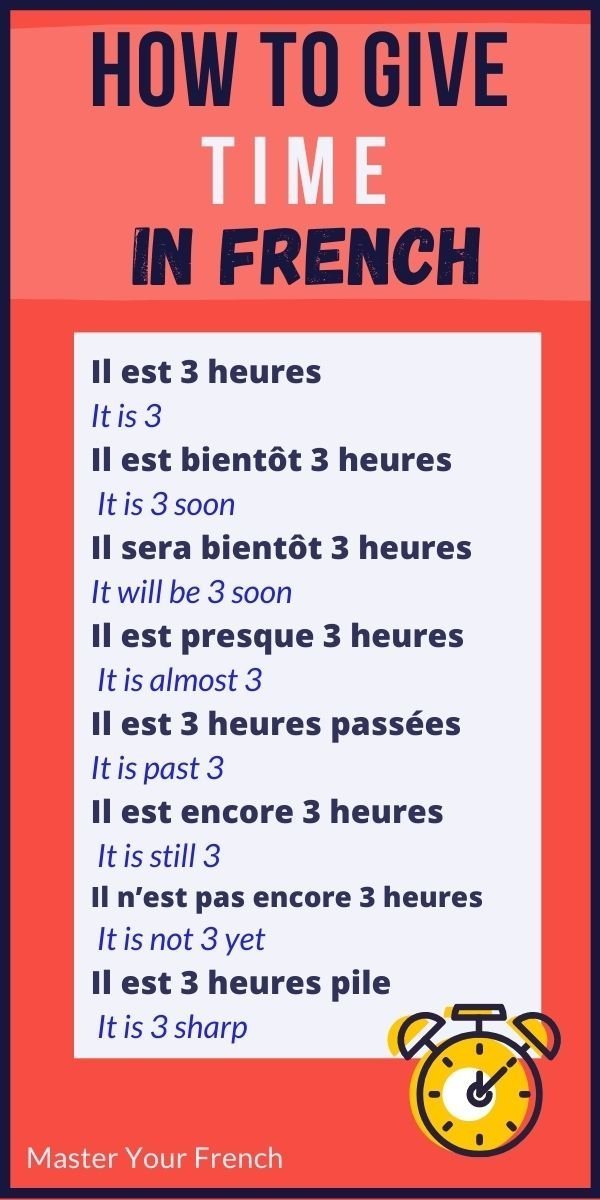Asking for and telling the time in French (with audio)
Updated: October 8, 2022 by Mylene in Guides and TipsArray ▪

Asking and telling time in French is pretty useful in real life — whether you’re traveling to a French-speaking country, trying to make an appointment, or even looking for a conversation ice-breaker. It’s an essential skill to know how to tell the time in French.
But what are the key French vocabulary words related to time? Is it just a matter of a few formulas combined with numbers in French? And how to master the basics of telling time in French?
In this article, you’ll learn how to ask questions about the time and you’ll discover useful French vocabulary words that you should know to express time in French:
- Periods of time in French
- Telling time in French
- Use “moins”
- The 24-hour clock
- Periods of the day
- The fractions
- How To Ask For The Time In French?
- How to give time in French?
Periods of Time in French
Learn the periods of time in French and listen to the right pronunciation.
Une seconde: a second
Seconde is a feminine noun in French: une seconde.
The plural is “les secondes”.
Une minute: a minute
Minute is a feminine noun: une minute.
The plural is “les minutes”.
Une heure: a hour
Heure is a feminine noun in French: une heure.
The plural is: “les heures”. The word “heures” begins with a mute h. You need to pronounce the liaison. The letter “s” is pronounced /z/.
To abbreviate a time in French, use the letter h (for heure).
For example:
11h10 means 11:10 in English.
Telling time in French
The simplest formula to tell the time in French is “il est” (it is in English).
Il est is impersonal.
For example:
- Il est une heure: it is one o’clock
- Il est deux heures: it’s 2 o’clock. You need to pronounce the liaison. The letter “x” is pronounced /z/.
- Il est trois heures dix: it’s 3:10. You need to pronounce the liaison. The letter “s” is pronounced /z/.
- Il est cinq heures cinquante: it’s 5:50
Use “moins”
From 31 to 59 minutes past the hour, you can say the next hour “moins” the number of minutes.
For example:
- Il est sept heures moins dix: 7 hours minus 10, meaning 6:50
- Il est trois heures moins vingt: 3 hours minus 20, meaning 2:40
The 24-hour clock
You need to know the numbers from one to 24. And if you’re looking to learn the right pronunciation, you can check this article on how to pronounce numbers in French.
In French, time is based on the 24-hour clock, like military time.
For example:
- Instead of 1 to 11 a.m., followed by 12 to 11 p.m., the clock continues counting up from 12.
For example:
- 1 p.m. is 13 in French
- 2 p.m. is 14 in French
- 3 p.m. is 15 in French
- 11 p.m. is 23 in French
- all the way up to 24
The periods of the day
Du matin
Du matin: in the morning or a.m (between midnight and 11 a.m.).
For example:
- Il est 6 heures du matin: it is 6 am or literally it is six hours in the morning.
Midi
Midi: noon or midday
Example:
- Il est midi: it’s noon / it’s midday.
De l’après-midi
De l’après-midi: in the afternoon or p.m. (between midday and 6 p.m.).
For example:
- En hiver il fait nuit à cinq heures de l’après-midi: In the winter, it’s dark at 5 p.m.
Du soir
Du soir: in the evening/at night or p.m. (between 7 p.m. and midnight).
For example:
- Ils mangent à huit heures du soir: they eat dinner at 8 p.m.
Minuit
Minuit: midnight
Example:
- Je me suis réveillée à minuit: I woke up at midnight.
The fractions
Those fractions can only be used with 1 to 12.
Et quart
For 15 minutes past the hour you can say “et quart” (meaning and a quarter).
For example:
- Il est une heure et quart: it’s a quarter past one.
Et demie
For 30 minutes past the hour, you can say “et demie” (meaning and a half).
For example:
- Il est six heures et demie: It’s half past six.
Moins le quart
For a quarter until the hour, you can say “moins le quart” (meaning minus the quarter).
For example:
- Il est trois heures moins le quart: it is a quarter until 3; or 2:45.

How to ask for the time in French?
Formal
- Quelle heure est-il ? What time is it?
- Est-ce que vous avez l’heure, s’il vous plaît ? Do you have the time please ?
- À quelle heure est le concert ? What time is the concert?
Casual
In what follows, each question means what time is it? :
How to give the time in French?
How to tell the time in French:
- Il est 13 heures: it is 1 p.m.
- Il est bientôt 13 heures: it is 1 p.m. soon
- Il sera bientôt 13 heures: it will be 1 p.m. soon
- Il est presque 13 heures: it is almost 1 p.m.
- Il est 13 heures passées: it is past 1 p.m.
- Il est encore 13 heures: it is still 1 p.m.
- Il n’est pas encore 13 heures: it is not 1 p.m. yet
- Il est 13 heures pile: it is 1 p.m. sharp
- ll est 13 heures pétantes: it is 1 p.m. sharp

After 12pm: Telling time the right way
After 12 pm, you must use “quinze” (instead of “et quart”), “trente” (instead of “et demie”), and “quarante-cinq” (instead of “moins le quart”).
For example, you can use any variation if it’s before noon:
- une heure quinze = une heure et quart: 1:15
- trois heures trente = trois heures et demie: 3:30
- quatre heures quarante-cinq = cinq heures moins le quart: 4:45
BUT if it’s afternoon (after 12) there is a right way, and a wrong way, to tell the time in French. Here are a few examples:
- 13:15
- The right way to tell time: treize heures quinze
- Don’t say:
treize heures et quart
- 15:30
- The right way to tell time: quinze heures trente
- Don’t say:
quinze heures et demie
- 16:45:
- The right way to tell time is: seize heures quarante-cinq
- Don’t say:
dix-sept heures moins le quart
Now you know how tell time in French
And now it’s the right time to join our online French courses and explore the many benefits that Master Your French has to offer.
At the same time, you can find similar articles in our how-to french guides where you can see how to write a professional email in French or also learn how to ask for and give directions in French.
A bientôt !
This post is also available in Français.

